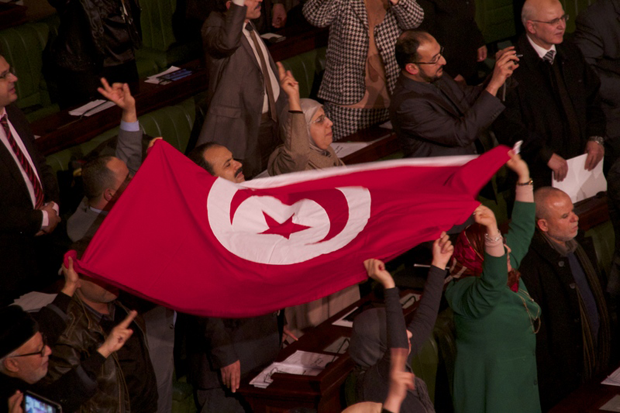Undermining progress: Digital surveillance and the Tunisian constitution

After decades of dictatorship and two years of arguments and compromises, Tunisians passed a new constitution laying the foundations for a new democracy. (Photo: Mohamed Krit / Demotix)
“A model to other peoples seeking reform” said UN Secretary-General, Ban Ki-moon on the successful passing in 2014 of the new Tunisian Constitution. Championing a secular political and legal system following the popular uprisings of 2011, this constitution sought to maintain robust protections of fundamental freedoms. However, the recent creation of the Technical Telecommunication Agency (ATT) threatens to undermine such progress and all in the service of digital surveillance.
Established by decree no. 2013-4506, bypassing parliamentary approval, ATT “provides technical support to judicial investigations into ICT-related crimes”, enabling it to monitor and record online traffic with full access to networks and information held by Internet Service Providers. Many critics of the agency liken it to the NSA; Tunisian Pirate Party member Raed Chammem stated on Twitter “We finally have our own Tunisian law-abusing agency…#NSA-like #A2T”.
The drafting process of the constitution demonstrated the core divergent forces at play in Tunisia. Central to this tension was the positioning of media freedom, most notably in the mandate and impartiality of the High Independent Authority for Audiovisual Communication (HAICA). Articles 122 and 124 reduced the authority to an advisory role as opposed to that of a regulator and required its membership to be elected by parliament. It took concerted lobbying by civil society activists and the National Union of Tunisian Journalists to modify both articles. As stated by Freedom House “the revised language is not just a victory for press freedom and the media sector, but also a triumph for Tunisia’s growing civil society.”
The fight for greater oversight by civil society and regulatory bodies as seen in the last minute amendments to the constitution has not, to date, impacted the creation and implementation of the ATT. The International Business Times wrote that the ATT “fails to properly define the organization’s relationship with judicial authorities, and there is no legal framework for providing civilian accountability”. They go on to quote Tunisian lawyer, Kais Berrjab who states that the ATT represents a “battery of legal irregularities related to unconstitutionality and illegality.”
With an emergent blogger-community, any movement to restrict, monitor or record online content, strikes at the heart of media freedom in Tunisia. Article five of decree no. 2013-4506 outlines that ATT activities will be “secret, unpublished and only sent to the government”. When coupled with the head of the agency being appointed by the Minister of Information and Communication alone, and government plans to exempt the ATT from legal obligations, which exist for all other agencies, in regards to transparency, the prominence of the state raises pertinent questions about the impartiality and non-partisanship of the agency.
The IB Times highlights a key motivation behind the creation of the ATT; the belief “that monitoring the activities of private citizens is essential to counterterrorism effort.” Indeed this argument is playing out across the world, most notably in the US concerning the actions of NSA and the UK with its own GCHQ.
Mounting public pressure to confront recent high-profile assassinations, as well as the perceived threat of Islamic extremism has been highlighted as key reasons for this move towards creating a more investigative body – ATT in all essences replaces the Tunisian Internet Agency (ATI) – however criticism remains as to how it can operate within the legal and political parameters outlined in the 2014 constitution.
In the same IB Times article, Jillian York of the Electronic Frontiers Foundation is quoted as saying, “starting with legitimate concerns about security, the state can then push beyond that and you see surveillance used against political dissidents or just in violation of basic privacy.” Herein lies the central conflict; the last minute redrafting of the constitution established civilian oversight, an impartial regulator and robust protections, but will the ATT, wired to the central government, through the Minister of Information and Communication, undermine such progress, making online participation as dangerous for journalists and bloggers as seen under the leadership of Zine el-Abidine Ben Ali?
The passing of the constitution proved to be a powerful call-to-action for Tunisian civil society, reshaping the government’s relationship with the media and civil society and embedding freedom of media and expression at the core of the legal and political system. But with the establishment of the ATT, Tunisia risks damaging this precedent, undermining the progress, as part of an ill-defined counterterrorism campaign.
The constitution cannot exist outside any effort to counter terrorism; it should, in fact, lie at the core of these efforts. The combatting of militancy and terrorism requires the support and involvement of all sectors of society, including the media and civil society. But if it is the state that strikes the first blow against the ideals and optimism contained within the constitution, will the emergent civil society be able to defend it?
This article was posted on May 20, 2014 at indexoncensorship.org
